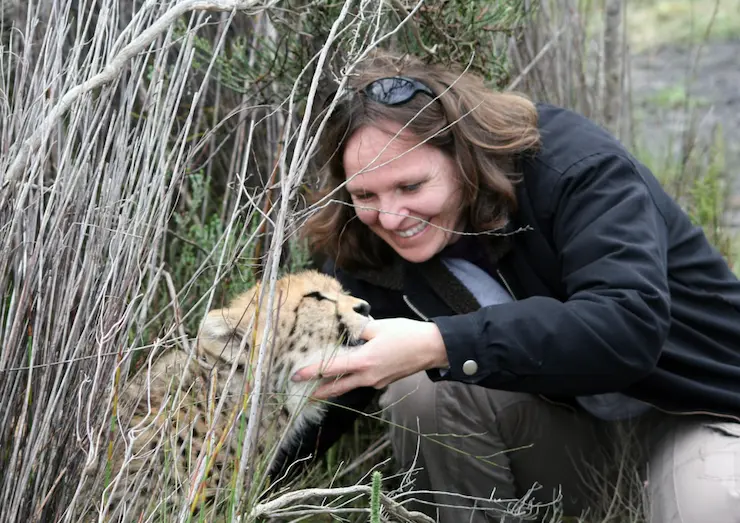For those with an innate curiosity about the natural world, careers in the natural sciences offer the opportunity to learn, grow, and make impactful discoveries continually. The natural sciences encompass fields ranging from physics and astronomy to environmental science and microbiology. Each discipline provides intellectual challenges and rewards for helping advance our scientific understanding.

As a natural science professional, you may find yourself designing innovative experiments in a laboratory, conducting field research in exotic locales, developing models to tackle big questions, or collaborating with other experts to uncover new knowledge. It will require focus and determination, but the potential for growth and discovery is immense.
With a natural science career, you can ask questions, test theories, make observations, analyze data, and keep pushing the boundaries of human knowledge.
Why pursue a career in the natural sciences?
Before jumping into specific natural science careers, let’s first discuss why this field is worth considering:
- Follow your innate curiosity – If you’ve always been interested in understanding how the natural world works, a science career allows you to turn your passion into a profession.
- Continually learn and grow – Science is ever-evolving, with discoveries each day. You’ll enjoy a lifelong journey of learning.
- Leave a positive impact – Many science careers better our lives and environment through medical breakthroughs, sustainability solutions, and increased understanding.
- Engaging and challenging work – Every day brings new intellectual challenges to solve meaningful problems through critical thinking, analysis, and research.
- Excellent job prospects and growth – STEM careers are projected to grow by 8% over the next decade, faster than all occupations. The need for scientific skills will only increase.
- Competitive salaries – Natural science careers are financially rewarding, with most offering salaries well above the national median.
If you’re intellectually curious, love solving complex problems through scientific inquiry, and want to make a difference, the natural sciences have much to offer.
Now, let’s explore some top career options within various fields.
Careers in Natural Sciences
We can start with life sciences that focus on living organisms and include diverse disciplines like biology, botany, ecology, and zoology. We can then continue with those who gaze up at the stars in wonder or are curious about the forces shaping our planet; the earth and space sciences provide the perfect outlet. And then, for analytical thinkers who want to understand what things are made of and how they behave, physics and chemistry offer rewarding opportunities to experiment and discover. Here are some prominent career paths:
1. Biologist

As a biologist, you study living organisms and their relationship to their environment. Depending on your specialty, you might investigate an organism’s molecular biology, physiology, behavior, classification, or ecosystem role.
Common types of biologists include:
- Molecular biologist – Study DNA, RNA, proteins, and how they interact in cells.
- Microbiologist – Examine bacteria, viruses, fungi, and other microorganisms.
- Marine biologist – Explore ocean ecosystems and aquatic organisms.
- Conservation biologist – Manage and protect biodiversity in endangered habitats and species.
As a biologist, you’ll design studies, collect field observations, perform lab experiments, analyze data, write scientific papers, and collaborate with other scientists. Some of the most sought-after qualities employers seek are critical thinking, analytics, attention to detail, and communication skills.
You’ll need a bachelor’s degree in biology or a related field like biochemistry or ecology. Many positions prefer or require a master’s or doctorate. The median salary is $71,650 but can reach $117,000 for top scientists.
2. Zoologist

Zoologists specifically study animal species’ physiology, behaviors, genetics, classification, habitats, and diseases. They may observe animals in controlled lab settings or natural environments.
Their research contributes to improved human health, wildlife conservation, and managing ecosystems impacted by invasive species or pollution. As a zoologist, you must be observant, patient, and willing to work outdoors at times. Strong written and verbal communication skills will also make a difference in the eyes of a potential employer.
Most zoologist positions require a master’s degree or Ph.D. in zoology or biology. The median salary is $62,290 but tops at around $97,000 for experienced researchers or directors of zoological research programs.
3. Pharmacologist

Pharmacologists study how pharmaceutical drugs interact with biological systems to understand their effects on the body. They investigate new compounds as potential treatments for diseases.
The role involves designing drug trials, monitoring outcomes in animals and humans, analyzing results, reviewing regulatory submissions for new drugs, and staying knowledgeable on the latest research. You will be required to show strong critical thinking and attention to detail.
A Doctor of Pharmacy or Ph.D. in pharmacology is required. The median salary is $127,000, with top scientists earning $208,000. Pharmacology offers excellent pay, steady demand, and the reward of bringing new life-saving drugs to market.
4. Physician
As a physician, you diagnose and treat injuries, illnesses, and chronic conditions in patients. With years of schooling and on-the-job training, physicians become highly experts in the human body and medicine.
Various specialties exist, including:
- Family medicine physician – Provide comprehensive care for patients of all ages.
- Pediatrician – Focus on the health of infants, children, and adolescents.
- Surgeon – Perform complex operations and procedures.
- Psychiatrist – Assess and treat mental health conditions.
Physicians examine patients, order tests, prescribe medications, develop treatment plans, and educate people on health topics. Excellent communication skills are required when speaking with patients and families. Experienced physicians also lead healthcare teams.
Becoming a physician requires 4 years of medical school after a bachelor’s degree, then 3-7 years of residency training. The median salary is $208,000 or higher in specialized fields like surgery. It’s a long path but brings great responsibility, intellectual challenge, and reward.
5. Geologist
Geologists study the Earth’s composition, processes, and history to understand its origins and discover natural resources. They examine rocks, fossils, tectonic plate movement, and geologic record patterns.
Many geologists split their time between working in the field (mountains, quarries, oceans) and labs. Strong analytic and critical thinking abilities are needed to interpret research implications.
Geologists find work in industries like petroleum, mining, construction, and environmental protection. Most positions require at least a bachelor’s degree in geosciences or geology. Median salary is $77,580 but exceeds $149,000 for some senior exploration geologists and geochemists.
6. Meteorologist
Meteorologists analyze weather patterns using scientific principles. They forecast short and long-term weather conditions, issue severe weather warnings, and study climate change.
The work involves monitoring atmospheric data, creating computer models, producing weather maps and graphics, and communicating forecasts via media. Physics, math, and computer skills are normally necessary, while strong presentation abilities are also taken into consideration by employers for on-camera forecasters.
Positions require at least a bachelor’s degree in meteorology or atmospheric science. Field research meteorologists may need a master’s or Ph.D. The median salary is $97,380, with top earners bringing in $148,000+.
7. Astronomer
Astronomers observe and interpret celestial bodies like stars, planets, and galaxies to understand the properties of outer space. They often specialize in cosmology, planetary science, or stellar astronomy.
The role involves performing space observations through telescopes and satellite data, developing theoretical models, and analyzing results. If you master computer programming and possess analytics skills, you are one step forward. As an astronomer, you must be highly detail-oriented while still seeing the big-picture insights.
A Ph.D. in astronomy or physics is required for most positions. The median salary is $114,590, with experienced astronomers earning up to $188,000. Teaching and researching at a university may also be an option.
8. Environmental Scientist
Environmental scientists identify environmental risks, study human impacts, and solve ecological challenges. They research and advise on pollution, climate change, deforestation, and sustainability.
Their main responsibilities are fieldwork, lab tests, data analysis, modeling, and regulatory review. Some of the qualities potential employers are looking for when educating communities or advising policymakers are excellent problem-solving skills, attention to detail, communication, and teamwork abilities.
Most positions require a bachelor’s degree in environmental science or a related field like geology or biology. Median pay is $73,230 but reaches $128,000+ for senior scientists and consultants.
9. Chemist
Chemists study the composition, properties, and interactions of substances. They perform experiments, analyze materials, interpret results, develop chemical processes, and solve problems in areas from biotechnology to nanomaterials.
Lab work is a significant component of the job. It would help if you show critical thinking to design sound experiments and meticulous attention to detail. Chemists must also interpret findings and convey technical information.
A bachelor’s in chemistry is sufficient for some entry-level roles, but a master’s or Ph.D. is often preferred or required. Median salary is $77,880, reaching up to $148,000. Major employers include pharmaceutical and chemical manufacturing companies.
10. Chemical Engineer
Chemical engineers optimize chemical processes and solve problems around producing or using chemicals, fuels, drugs, food, and other products. They design equipment, oversee plant operations, and develop safety procedures.
Strong analytical and problem-solving skills are needed to balance productivity, quality, and safety. Chemical engineering requires communication abilities and extensive numeracy to design facilities and processes.
A bachelor’s degree in chemical engineering is the typical entry point. Licensure may eventually be needed. The median salary is $108,770, with experienced engineers earning $184,000 or more in technical or management roles.
11. Physicist
Physicists study the fundamental properties and laws that govern matter, energy, atoms, and the forces of nature. Their work advances our understanding of quantum mechanics, thermodynamics, electronics, nuclear processes, etc.
Lab research, designing experiments, analyzing data, developing theories through mathematics, and testing predictions make up the work. In general, employers are looking for critical thinkers and problem-solving-oriented people. Specialties like astrophysics also require direct observation skills.
A Ph.D. in physics or astronomy is needed for most physicist roles. Median pay is $128,970, with experienced scientists earning $208,000 or more depending on their field and reputation. Senior physicists may lead research programs at universities or government labs.
12. Nuclear Engineer
Nuclear engineers harness nuclear energy in electricity generation, medicine, imaging, and more applications. They design nuclear equipment like reactor cores and radiation shielding, test systems, monitor safety, and solve problems to improve performance.
Physics, nuclear science, and math expertise help analyze and troubleshoot issues—attention to detail and systematic thinking help when dealing with radioactive materials. When reporting or documenting specifics, technical communication skills will come in handy.
A bachelor’s degree in nuclear engineering is at least required, but most roles prefer a master’s or Ph.D. The median salary is $108,300, with top earners getting $182,000+. Strong growth and high pay make this a rewarding field.
Key Takeaways for Students
To recap, here are some key points to guide students exploring natural science careers:
- Identify your interests – Life sciences, earth sciences, physics, chemistry, etc. There are so many directions to pursue your curiosity!
- Research different roles – Biologist, chemist, physicist – each field has numerous specialties waiting to be explored.
- Understand the education requirements – Natural science careers typically need a bachelor’s and often a master’s or Ph.D. Plan the necessary schooling.
- Develop key hard and soft skills – Excel in analytics, critical thinking, attention to detail, communication, collaboration, and problem-solving.
- Consider your preferences – Do you want to work more in the field, the lab, or the office? Balance research with teamwork?
- Weigh the potential salary and job outlook – Natural science careers offer high pay, growth, and plentiful opportunities.
- Get relevant experience – Pursue internships, shadow professionals, work in labs/clinics, and build your network.
- Stay curious and open-minded – Science advances every day. Pursue knowledge with creativity, objectivity, and a collaborative spirit.
The natural sciences offer intellectually stimulating work environments where you can continually expand your thinking.
Frequently Asked Questions
What types of skills are most important for a career in natural sciences?
Excelling in the natural sciences requires strong analytical thinking, math and statistics abilities, computer literacy, attention to detail, creativity, oral and written communication skills, and intellectual curiosity. Different specialties also call for additional strengths like spatial reasoning, athleticism for fieldwork, artistic talent for scientific illustration, management capabilities for leadership roles, and more.
How competitive is it to enter natural science careers?
Many natural science careers require a Ph.D., extensive education, and relevant experience. Therefore, competition can be stiff. Gaining acceptance to top graduate programs or research roles takes hard work. Pursue internships, develop your qualifications, network early on, be patient throughout the long education journey, and persevere in the job hunt.
What entry-level natural science jobs can I obtain with a bachelor’s degree?
While many science careers expect or require a master’s or doctorate, options with a bachelor’s degree include lab technician, field sampling technician, pharmacy technician, biological aide, geology assistant, weather forecaster, hazardous waste specialist, food science technologist, science teacher, computer systems analyst, and quality control technician.
Should I expect to conduct fieldwork? How much does the job involve working outdoors?
The amount of fieldwork depends greatly on your specialty within the natural sciences. Geologists, environmental scientists, archeologists, field ecologists, and meteorologists can expect frequent fieldwork at excavation sites, in nature preserves, on mountains gathering rock samples, deploying weather monitoring equipment, or in a city measuring noise pollution. Biologists, chemists, physicists, and medical scientists often work indoors in offices, labs, and clinical settings.
How can I stand out and be a competitive applicant for natural science jobs?
Pursuing a Ph.D. if required, getting published in scientific journals, seeking internships and laboratory experience, having strong academic marks, learning specialized technical skills like GIS, joining science organizations, attending conferences, completing a thesis, taking on leadership roles in research projects or clubs, learning computer programming and data skills, and getting licensed if required (such as for a physician) can all help make you stand out when applying for natural science positions.
What is the job outlook for natural sciences?
Strong growth is projected for natural science occupations over the next decade. Biomedical engineering jobs are projected to grow by 11% by 2031. Environmental science should grow by 8% over the same period. Even slower-growing but large fields like chemistry will still create several thousand new positions yearly. Healthcare and technology advances will drive demand for scientific expertise.
Do I need to pursue a Ph.D. for a successful natural science career?
While a significant number of natural science roles do require a Ph.D., you can still build a good career with a bachelor’s or master’s through positions like geology technician, clinical lab scientist, high school science teacher, medical equipment sales representative, food scientist, wildlife biology aide, and more. Weigh your interests and career goals when deciding on education. A Ph.D. opens more senior research and university opportunities.
What natural science careers have the highest salary potential?
The natural science careers offering the highest salaries, with a median of around $200,000 or more, include physician (specialists like surgeons with a $208,000 median), pharmacologist ($208,000), physicist ($128,970), biomedical engineer ($88,550), astronomer ($114,590) and geoscientist ($91,130). However, even lower-paid scientific fields tend to pay above average.
Is extensive lab work required for most natural science careers?
Hands-on lab experience is vital for chemistry, biology, biochemistry, and some engineering disciplines. Others may do less intensive lab work, like astronomers, ecologists, geologists, meteorologists, and physicians (who rely more on clinical rotations and residencies). But overall, expect to spend time in labs, whether in academia, government, industry, or healthcare. Lab skills are prized in natural sciences.
